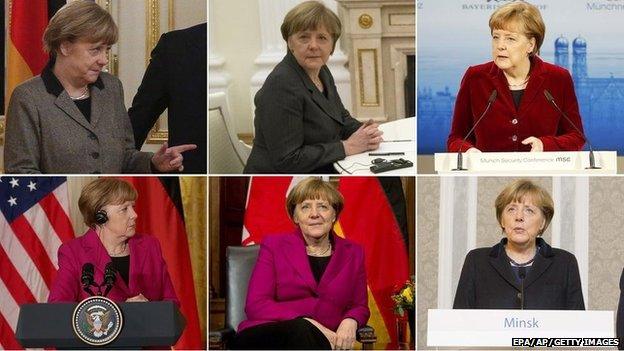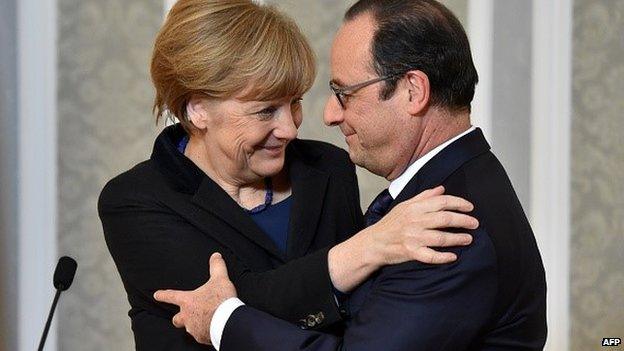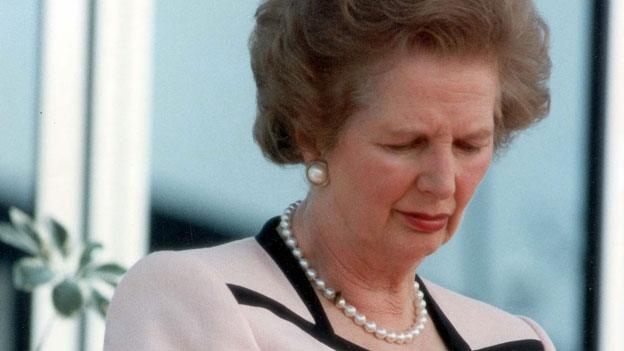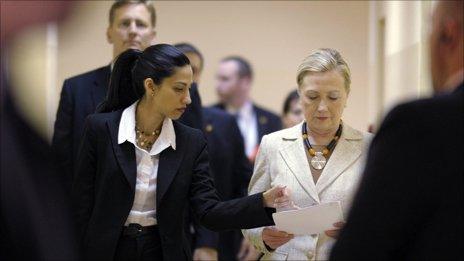Angela Merkel: German leader's marathon week of diplomacy
- Published

Mrs Merkel's busy week: If it's Tuesday, it must be Ottawa
Kiev, Moscow, Washington, Ottawa, Minsk, all in the space of one week, with high-profile domestic commitments in Munich and Berlin on top - German Chancellor Angela Merkel, it seems, has had a busy week even by her standards.
Engagements in six countries with overnight flights and overnight talks, culminating in 17-hour negotiations to thrash out a ceasefire deal in Minsk lasting into Thursday morning, have made "the most powerful woman in Europe", as she is often called, also one of the busiest.
German papers, not surprisingly, are beginning to wonder: "How does she do it and when does she sleep?"
Her recent travel and negotiating marathon would have pushed most people to the brink, German weekly Focus says in its latest edition, yet the 60-year-old chancellor rarely shows signs of fatigue.
'Rising with the challenge'
The answer from her entourage, the paper says, is usually that she is very robust and that "her ability to concentrate rises with the challenges she faces".
Compared with previous chancellors, travelling with Mrs Merkel is always a tightly-scheduled affair, says Ralf Schuler of Germany's Bild newspaper.
He's been accompanying her and other German leaders before her for years.
"She likes to fly overnight, when at times she may get more sleep than the security staff and journalists in economy class at the back of the plane," he says.
He recalls one particular trip to a summit meeting in Chile, which involved 34 hours of travel with only 22 hours on the ground, "the kind of schedule that can require a change of flight crew within one trip".
In a rare interview about her personal life, Mrs Merkel herself once said she had some "camel-like qualities", allowing her to live off reserves and catch up on sleep at weekends, while during the week she was perfectly fine with four hours.
Asked what fed the myth of her ability to go through an all-night EU summit and still be fit the following morning, her answer was simple: "The best way to feed the myth is to make it happen."

German Chancellor Angela Merkel and French President Francois Hollande hugged after all-night negotiations in Minsk to secure a ceasefire in eastern Ukraine
But is it advisable to let leaders take decisions affecting the lives of millions after prolonged stretches of little or no sleep?
Some sleep scientists, such as Professor Kevin Morgan of Loughborough University's Sleep Research Centre, say there is no correct amount of sleep.
Looking at the example of former British Prime Minister Margaret Thatcher, another leader famous for her indefatigability, he says for a small minority of people, no more than 1%, as little as four hours a night may be enough.
Others disagree and say adults need six to eight hours if they want to avoid long-term damage to their health.
"Even in the short-term, periods of sleep deprivation will lead to cognitive impairment," says Professor Franco Cappuccio, who heads the Sleep, Health and Society Programme at Warwick University.
"You may be alert, but the functioning of your brain and your ability to articulate your thoughts is still affected and it can be equivalent to being over the limit to drive," he says.

Chancellor Merkel's schedule:
Thursday 5 February: Kiev talks kicking off a week Ukraine diplomacy
Friday 6 February: Berlin meeting with Iraqi PM followed by Moscow talks with Vladimir Putin
Saturday 7 February: Speech before Munich Security Conference
Sunday 8 February: Departure for Washington
Monday 9 February: Ukraine talks with President Barack Obama
Tuesday 10 February: Ottawa talks with Canadian Prime Minister Stephen Harper
Wednesday 11 February: Berlin state funeral for former German president, departure for Minsk summit
Thursday 12 February: Minsk talks end in the morning, onward journey to EU summit in Brussels

He suspects misconceptions as well as "macho attitudes" are behind claims of being able to cope with as little as four hours of sleep a night.
He says he worries when he hears claims of leaders getting by on four hours sleep, and of important deals arrived at after endless overnight haggling. Where a chronic lack of sleep is combined with frequent travel, the impact is aggravated, he adds.
Having clocked up almost 600,000 miles of travel in her first 18 months as US Secretary of State, Hillary Clinton once told the BBC that undertaking a long multi-country foreign trip was like "being in a bubble - a caravan going from place to place".
Jake Sullivan, her policy planning director during an extensive tour of Africa in 2011, put it in slightly more worrying terms.
"Foreign policy is being made by imperfect people who face imperfect choices and have to use an imperfect process to reach decisions," he said at the time, although quickly added that "all decisions arrived at were carefully considered".
Mrs Clinton herself admitted that the gruelling schedule sometimes took its toll.
"I won't lie to you. I'm tired. My friends call and email me and say 'Oh my gosh, I saw you on television. You look so tired!' To which I reply: Gee, thanks a lot!'"
As for Mrs Merkel, tiredness was not an option this week.
From the all-night talks in Minsk it was straight on to the European Union summit in Brussels to address that other European crisis, the stand-off with Greece over its bailout terms in which, yet again, she finds herself in a key position.
- Published10 April 2013

- Published14 July 2011

- Published9 October 2013
